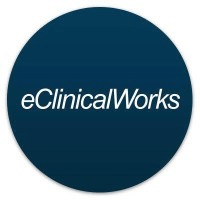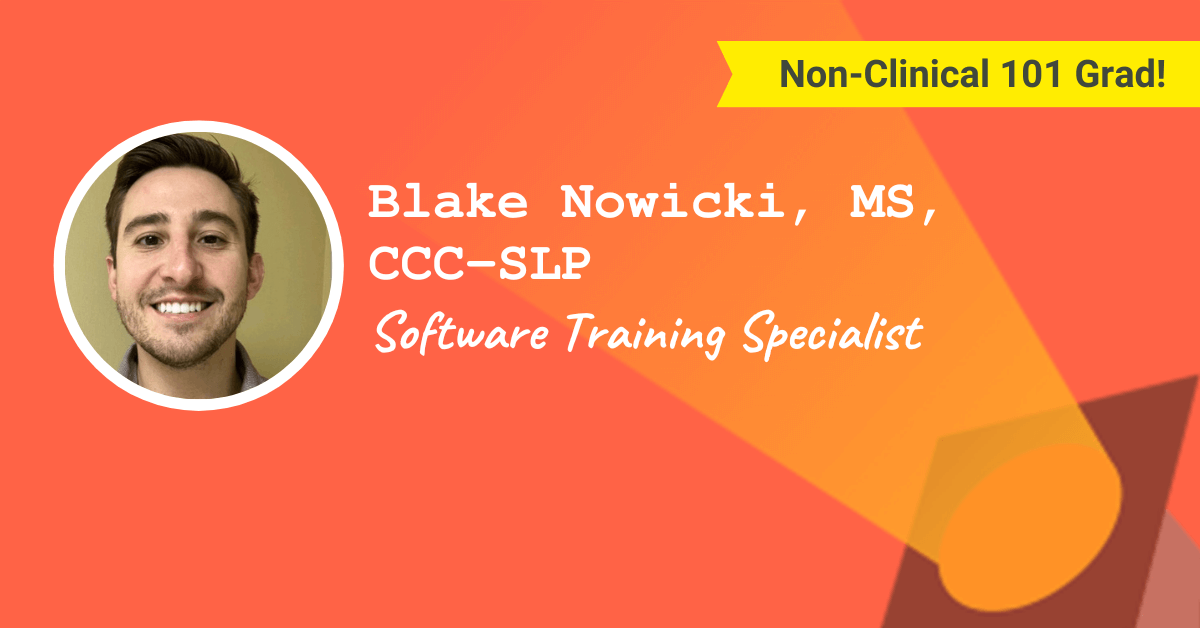This week’s spotlight is on Blake Nowicki, MS, CCC-SLP, a Non-Clinical 101 graduate who is now Software Training Specialist for eClinicalWorks!
This post may contain affiliate links or codes. This won’t increase your cost, but it helps keep TNCPT alive, and free of annoying ads! Thank you for your support. 🙂
What is your full name, title, and company name for your current, primary role?
Blake Nowicki, MS, CCC-SLP — Software Training Specialist at eClinicalWorks

Where are you located?
Tampa, Florida.
Where did you go to SLP school, and what year did you graduate?
East Tennessee State University, 2018.
Please refrain from contacting our spotlight participants on social media. There are thousands of readers just like you out there. 🙂 Please ask your questions in the comments on this blog post.
If you’re a Non-Clinical 101 student, you can network with many of our spotlight participants in the alumni groups!
What did you do when you first finished school, and for how long?
I worked at a skilled nursing facility (SNF) and a long-term acute care hospital (LTACH) for about two years before transitioning to a leadership role.
In what setting(s) did you work, and what types of patients did you treat?
In the LTACH, I worked with a lot of high-acuity tracheostomy and ventilator patients doing:
- In-line PMV for voice
- Dysphagia therapy and MBSS for swallowing
- Language and cognitive therapy—depending on the deficits the patient presented with or what their diagnosis was
What did you enjoy about your early roles? What didn’t you enjoy?
I love to learn, and there’s really nothing grad school can do to prepare you for everything you’ll see and treat in the real world. I was fortunate enough to work with a really good team of brilliant co-workers, both on the rehab team and hospital wide, who I could always count on to fill in the gaps of experience and knowledge.
I loved that I could walk into the respiratory department break room and troubleshoot ideas with them, or more realistically, get a crash course in all things trach/vent relative to my current situation.
What else have you done since then, prior to your current role?
For the past three years, I worked as Director of Rehabilitative Services. That was everything short of a non-clinical role, even in the LTACH setting. I was ready for a change!
When and why did you decide to do something non-clinical?
I decided to go non-clinical six months into the workforce. In all actuality, I have enjoyed patient care and helping people reclaim their independence and life back. It has been a very rewarding last few years.
For me, it was multifaceted. Between working through the pandemic in trash bags for PPE to the high productivity standards along with the never-ending administrative workload, “success” was unachievable, and burnout was inevitable.
What are you doing these days?
I work as a software training specialist for a healthcare IT company called eClinicalWorks. I train various clients in our EHR and practice management software systems and genuinely enjoy what I do!
I do both remote trainings and on-site trainings across the country. The travel aspect is great—a welcome change of pace!
Are you still treating patients, or are you solely non-clinical?
I am solely non-clinical for the time being.
How long have you been in your software training specialist role?
I have been in my current role since October 2023.
What do you wish you would’ve known before going into this role?
I wish I’d known that positions like this were even available to people like us therapists with such admirable, yet specific, degrees. It’s hard to know what other career tracks are out there without programs like Non-Clinical 101.
Did you get any special certifications or training along the way to help you get into your current role?
Oh yes, I had access to Skillsoft/Percipio website through a previous employer. I took as many courses and obtained as many certificates as I could that would put me in a better position and make my resume stand out.
Aspireship has great Customer Success Foundations and SaaS Sales Foundations courses (and many more) that helped me better understand this whole new world I was jumping into.
And, of course, the Non-Clinical 101 course that breaks down all the various career paths and how your skills as a therapist can be applicable. It gives you all the resources to improve these skills, including where to find the job postings and recommended sites. It was a Godsend for me!
How did you find your job? Did you apply or find it through a connection?
I found my job on LinkedIn.
Did you do anything special to your resume and cover letter to land the job?
Yes, my resume was chaos prior to Non-Clinical 101. I took a whole week to restructure and rephrase my entire resume with the information that Non-Clinical 101 offered.
I also paid for a monthly membership on a website that uses AI to analyze your resume and gives beneficial suggestions for changes that should be made based on the role you are applying to.
What was the interview like for the software training specialist role?
The interview was straight forward. Again, Non-Clinical 101 provides you with packets on various roles and how the interview preparation for each role should be uniquely done.
What are some of the things you did to stand out, take initiative, and advance in your career?
I think taking on the director role in my previous job put me in a great spot to prepare for my current role. I had no option but to be painfully organized, and it allowed me to be a part of the hospital leadership team. The experience I gained from that was invaluable.
How have people reacted to you leaving patient care?
People have been very supportive and happy I’m finally happy. I haven’t received any negative feedback.
What’s a typical day or week in the life like for you? What types of tasks and responsibilities fill your time?
I wake up and check my schedule—sometimes remote trainings can be added last minute, or I might need to fill in for another trainer. I do trainings for clients that already have our software, but they might want a better understanding of a certain topic.
When I am not training, I help out other departments or my own department with behind-the-scenes projects.
On weeks that I am doing an on-site training, I typically fly out Sunday evening and fly back Thursday evening, with Fridays off for travel weeks. It’s pretty great.
What are some of the rewards of your software training specialist role? What are the biggest challenges?
With provider schedules, it can sometime be difficult to ensure that I have enough time to train them in the system, but you roll with the punches and adapt.
For rewards, I would say finishing up at a site and having all the staff feel comfortable with the system and know all their workflows to accomplish their tasks. As well as the airline and hotel rewards you rack up from traveling.
How did your clinical background prepare you for this role? Which skills transferred?
My clients can be family medicine or general doctor’s offices, but I specialize in ambulatory surgery centers, vascular, GI, and pain management.
It’s nice that I can use my experience and knowledge from working in acute care and the ICU to better understand and create the best possible workflows within our system for the providers and staff.
You must be organized and know how to talk to people. It’s all about pragmatics, communication skills, and having that medical background, so you can converse with the providers in a language they understand.
Roughly speaking, how are the hours and pay compared to patient care?
The hours vary, depending on the client. If I am training a California client, then I work on their schedule.
For pay, there was a decrease in earnings, but what you have to understand—if you want to make the jump to a non-clinical role—is that you are starting a completely new career. With careers outside of healthcare, I have found that you have the long-term ability to balance out to what you were making, and typically make more. At the end of the day, how badly do you want to get out of healthcare? You have to prioritize what’s important to you.
What type of person do you think would do well in your software training specialist role?
You need to be:
- Detail-oriented
- Patient with people (not everyone learns the software as fast as others)
- Able to articulate and communicate in a way that makes sense to others
Do you work remotely or onsite?
I work remotely. However, as I said, I do travel for the on-site trainings.
Does your organization hire PT, OT, or SLP professionals into non-clinical roles? If so, what type of roles?
Yes, they love when people come from healthcare!
Did you read any books, take any courses, or do anything special overall to get you where you are today?
Yes! Non-Clinical 101, Aspireship, Skillsoft, and HubSpot Academy.
What is a typical career path for someone in your software training specialist role?
Someone in my role can easily choose what their career path will be—at least at my company.
You can stay in the training department and work your way to training manager, or you can to join any of the other teams (account management, project management, etc.). The list goes on.
What is next for you? What are your high-level career aspirations?
I see longevity in the company I am with. I genuinely enjoy working for eClinicalWorks, and they take care of their employees.
I would love to stay with the company and, as I learn more about the other departments, possibly making a transfer into project management. It might be too early to tell at this point.
Do you have any special advice for others who want to follow in your footsteps?
Do not let rejection get the best of you!!!
I applied to 100+ positions, desperate to get out of healthcare (we’ve all been there). I was met with rejection because, as a therapist, I didn’t have five years of project management skills or agile experience in the workflow.
Focus on the things you CAN control.
Get certifications, build your resume, take courses, and don’t stop applying—that next application could be your ticket out!





